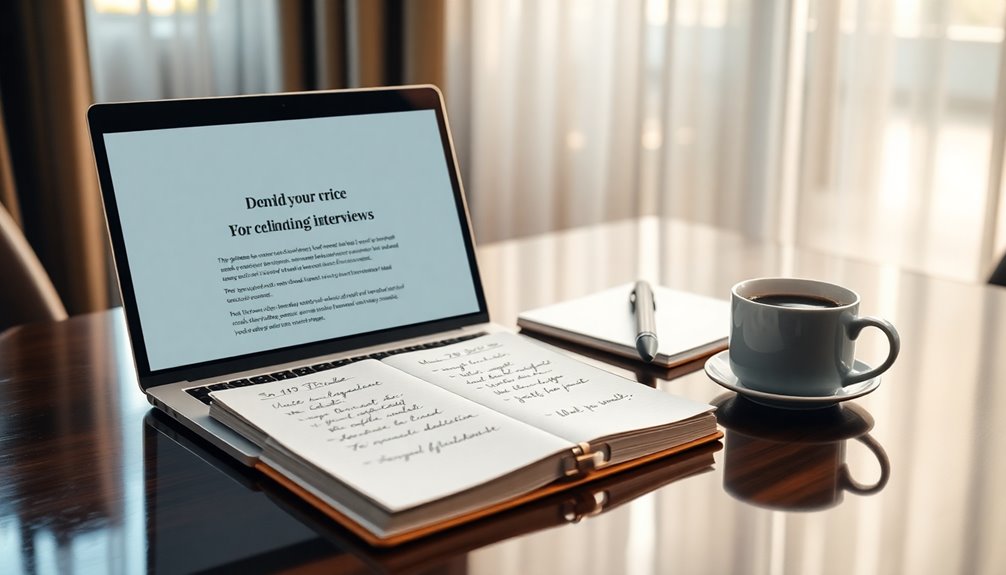Mastering the art of politely declining interviews is essential for your professional image. Start by responding promptly to show respect. Use a courteous tone, and clearly state your decision without going into too much detail. Always express gratitude for the opportunity; it leaves a positive impression that can benefit your career in the future. You might decline due to finding a better fit, personal changes, or other circumstances. Templates can help guarantee your message is professional. Master these techniques, and you'll navigate declines with confidence and grace. There's more to evaluate for successful communication, so keep exploring your options.
Key Takeaways
- Respond promptly to interview requests to show respect and professionalism.
- Use a courteous tone and express gratitude to maintain goodwill with the company.
- Clearly state your decision to decline without delving into excessive details.
- Indicate your openness to future opportunities or interactions to foster networking.
- Preserve your professional reputation by declining politely, supporting future career endeavors.
Reasons for Declining an Interview

When considering whether to decline an interview, you might find there are several compelling reasons to do so.
Perhaps you've discovered unfavorable information about the company, like financial issues or a values mismatch. You may have secured a new job that aligns better with your career goals or experienced personal life changes, leading you to seek part-time work or relocation.
It's also possible that your current employer has offered you incentives to stay, like a raise or bonus.
Finally, if you've lost interest in the position due to better opportunities, it's perfectly valid to decline. Each of these reasons reflects your priorities and career aspirations, making it essential to recognize when it's time to step back.
Importance of a Polite Decline

Declining an interview politely can go a long way in maintaining your professional reputation. When you choose to decline graciously, you not only respect the interviewer's time but also pave the way for future interactions.
Here's why it's significant:
- Positive Reputation: A polite decline reinforces your professionalism, making you memorable in a good way.
- Future Opportunities: Leaving a positive impression can open doors for potential roles with the same company later on.
- Networking: Respectful communication helps build a network, which is essential in your career.
- Industry Relationships: Avoiding negative impressions can strengthen your connections within the industry, ensuring smoother interactions in the future.
Being courteous in your decline reflects well on you and your career journey.
How to Politely Decline

Maneuvering the process of declining an interview can be straightforward if you follow a few key steps.
First, respond promptly to the interview request—timeliness shows respect for the interviewer's time. Use a courteous tone, whether you're communicating via email or phone.
Clearly state your decision without going into excessive detail; a simple acknowledgment is often enough. Be sure to express gratitude for the opportunity offered, as this maintains goodwill.
If you wish, you can also leave the door open for future interactions, indicating your openness to other opportunities down the line.
Templates for Declining Interviews

Crafting a polite response to decline an interview can be straightforward with the right templates at your disposal. Here are some effective options you can use:
- Simple email template: "Thank you for the opportunity, but I must decline."
- Personal reasons: "Due to changes in my personal circumstances, I can't proceed."
- New job acceptance: "I have accepted another position that aligns better with my career goals."
- Financial concerns: "After further consideration, I believe this role doesn't meet my current needs."
These templates keep your response professional and respectful while clearly communicating your decision.
Adjust them as needed to match your situation, ensuring you maintain a positive connection for future opportunities.
Potential Outcomes of Declining

Choosing to decline an interview can lead to several beneficial outcomes for your career. First, you preserve professional relationships, keeping doors open for future networking. This respectful approach enhances your reputation, showcasing your professionalism in the job market.
Additionally, by declining, you avoid potentially uncomfortable interview situations, allowing you to focus on opportunities that truly align with your goals. You might also gain valuable feedback or advice from recruiters, which can help clarify your career direction.
Ultimately, this decision can provide increased clarity on your job preferences, ensuring you pursue paths that resonate with your aspirations. Overall, declining an interview can be a strategic move that positions you favorably in your career journey.
Frequently Asked Questions
How Should I Handle a Last-Minute Interview Cancellation?
If you need to cancel a last-minute interview, act quickly.
Reach out to the interviewer, ideally through email or phone, to explain the situation. Keep it brief and professional, expressing your regret for the inconvenience.
It's important to thank them for their understanding and the opportunity. If possible, suggest rescheduling to show your continued interest.
This way, you maintain a positive impression and keep the door open for future opportunities.
Can Declining an Interview Affect My Chances With Other Companies?
Yes, declining an interview can impact your chances with other companies. If you handle it poorly, you might leave a negative impression, but if you decline politely, you can maintain a good reputation.
Recruiters remember how you treat opportunities, and a respectful decline keeps the door open for future chances. Ultimately, your professionalism can enhance your network, leading to more favorable prospects down the line.
Always prioritize clear, courteous communication.
Is It Acceptable to Decline an Interview via Text Message?
It's generally not recommended to decline an interview via text message.
While it might seem quick and convenient, a more formal approach, like email or a phone call, shows professionalism and respect for the recruiter's time.
You want to maintain a positive impression, as you could cross paths with them in the future.
What if I Want to Decline but Still Want Feedback?
If you want to decline an interview but still seek feedback, be direct yet polite in your response.
Thank the interviewer for the opportunity, then let them know you're unable to proceed.
You can add a line expressing your interest in receiving feedback on your application or interview process.
This way, you maintain a professional tone while opening the door for valuable insights that can help you in your job search.
How Can I Keep My Options Open After Declining an Interview?
Imagine you're at a lively café, sipping coffee, when you decide to decline that interview.
To keep your options open, respond promptly and express your gratitude for the opportunity.
Politely mention that you hope to connect again in the future.
This way, you maintain a positive relationship, which could lead to new openings down the road.
It shows professionalism and keeps the door ajar for potential opportunities later on.
Conclusion
To sum up, mastering the art of politely declining interviews not only protects your professional reputation but also keeps future opportunities alive. Did you know that 70% of hiring managers appreciate candidates who communicate respectfully, even when declining? By handling these situations with courtesy and professionalism, you can navigate your career journey with confidence. Remember, the way you decline an interview can leave a lasting impression, so it's worth taking the time to do it right.
Eugene brings a fresh, dynamic voice to our platform as one of our talented Writers. Specializing in research-driven content, he explores the latest findings in psychology and personal growth, translating them into actionable insights for our readers. Eugene’s work is fueled by a curiosity about what makes us tick and a desire to help others unlock their potential.










